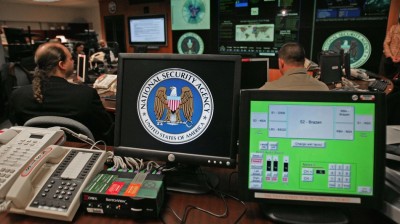This Brilliant New Plan May Finally Stop The NSA’s Spying
Legislators in eight states have introduced laws designed to literally pull the plug from the National Security Agency by choking off the resources the organization needs to organize within a state’s borders.
The bills are part of an effort to end what critics see as the NSA’s systematic violation of the Fourth Amendment to the US Constitution.
“We’re saying, ‘No, it’s inappropriate.’ We have a Fourth Amendment to the Constitution,” Washington State Representative David Taylor (R-Moxee) told USA Today. “And if you violate that there’s going to be civil penalties and jail time.”
Taylor is a co-sponsor of state House Bill 1473, which would make it a misdemeanor punishable by up to a year in jail and a fine of up to $5,000 for state officials or state contractors that “provide material support, participation, or assistance in any form” with any federal agency which collects “electronic data or metadata of any person pursuant to any action not based on a warrant.”
The idea behind the law is to prevent any company from doing business with the NSA. Among other things, the proposed law would prohibit utilities from providing water, natural gas and electricity and tech companies like Microsoft and Amazon.com from doing business with the NSA. It would also stop contractors from delivering food to federal facilities and end service like trash collection.
Learn How To Become Invisible In Today’s Surveillance State!
This is the second time that Taylor has sponsored legislation to stop the NSA from operating within his state. Last year he sponsored a similar law, which did not receive a vote.
Grass Roots Efforts
An organization called OffNow.org is encouraging state legislators to introduce similar bills. The group’s mission is a bold but simple one: Make it impossible for the NSA to operate in the United States by barring companies and local governments from doing business with it.
“The short version?” the group’s website proclaims. “We intend to pull the rug out from under them, box them in and shut them down.”
The website contains model legislation called the Fourth Amendment Protection Act and details the group’s strategy to bypass Congress and assert state’s rights against federal surveillance. The model legislation is at the heart of the plan.
“This model legislation, ready for introduction in any state, would ban a state (and all its political subdivisions) from providing assistance or material support in any way to federal spying programs,” the OffNow website states.
This would include, but is not limited to:
States with Similar Bills
Laws based on the model legislation have been introduced in state legislatures in Indiana, South Carolina, Oklahoma, Mississippi, Missouri, Oklahoma and Alaska as well as Washington State, USA Today reported. Some of the laws go further than OffNow’s model and ban evidence from warrantless surveillance from being used in state courts.
OffNow’s website reported that 171 universities nationwide operate National Centers of Academic Excellence in partnership with the National Security Agency’s Central Security Service
The bills are part of an effort to end what critics see as the NSA’s systematic violation of the Fourth Amendment to the US Constitution.
“We’re saying, ‘No, it’s inappropriate.’ We have a Fourth Amendment to the Constitution,” Washington State Representative David Taylor (R-Moxee) told USA Today. “And if you violate that there’s going to be civil penalties and jail time.”
Taylor is a co-sponsor of state House Bill 1473, which would make it a misdemeanor punishable by up to a year in jail and a fine of up to $5,000 for state officials or state contractors that “provide material support, participation, or assistance in any form” with any federal agency which collects “electronic data or metadata of any person pursuant to any action not based on a warrant.”
The idea behind the law is to prevent any company from doing business with the NSA. Among other things, the proposed law would prohibit utilities from providing water, natural gas and electricity and tech companies like Microsoft and Amazon.com from doing business with the NSA. It would also stop contractors from delivering food to federal facilities and end service like trash collection.
Learn How To Become Invisible In Today’s Surveillance State!
This is the second time that Taylor has sponsored legislation to stop the NSA from operating within his state. Last year he sponsored a similar law, which did not receive a vote.
Grass Roots Efforts
An organization called OffNow.org is encouraging state legislators to introduce similar bills. The group’s mission is a bold but simple one: Make it impossible for the NSA to operate in the United States by barring companies and local governments from doing business with it.
“The short version?” the group’s website proclaims. “We intend to pull the rug out from under them, box them in and shut them down.”
The website contains model legislation called the Fourth Amendment Protection Act and details the group’s strategy to bypass Congress and assert state’s rights against federal surveillance. The model legislation is at the heart of the plan.
“This model legislation, ready for introduction in any state, would ban a state (and all its political subdivisions) from providing assistance or material support in any way to federal spying programs,” the OffNow website states.
This would include, but is not limited to:
- Refusing to supply water or electricity.
- Ending NSA partnerships with public universities and colleges.
- Prohibiting state officials from using warrantless data given to them by federal agencies.
States with Similar Bills
Laws based on the model legislation have been introduced in state legislatures in Indiana, South Carolina, Oklahoma, Mississippi, Missouri, Oklahoma and Alaska as well as Washington State, USA Today reported. Some of the laws go further than OffNow’s model and ban evidence from warrantless surveillance from being used in state courts.
OffNow’s website reported that 171 universities nationwide operate National Centers of Academic Excellence in partnership with the National Security Agency’s Central Security Service




No comments:
Post a Comment